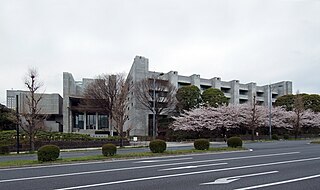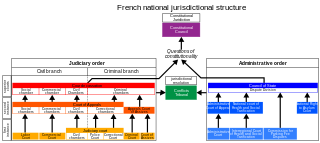Related Research Articles
Precedent is a principle or rule established in a legal case that becomes authoritative to a court or other tribunal when deciding subsequent cases with similar legal issues or facts. The legal doctrine stating that courts should follow precedent is called stare decisis.
Judicial independence is the concept that the judiciary should be independent from the other branches of government. That is, courts should not be subject to improper influence from the other branches of government or from private or partisan interests. Judicial independence is important for the idea of separation of powers.
The judiciary of Germany is the system of courts that interprets and applies the law in Germany.
Legal realism is a naturalistic approach to law; it is the view that jurisprudence should emulate the methods of natural science, that is, it should rely on empirical evidence. Hypotheses must be tested against observations of the world.
Legal formalism is both a descriptive theory and a normative theory of how judges should decide cases. In its descriptive sense, formalists maintain that judges reach their decisions by applying uncontroversial principles to the facts; formalists believe that there is an underlying logic to the many legal principles that may be applied in different cases. These principles, they claim, are straightforward and can be readily discovered by anyone with some legal expertise. Supreme Court Justice Oliver Wendell Holmes Jr., by contrast, believed that "The life of the law has not been logic: it has been experience". The formalist era is generally viewed as having existed from the 1870s to the 1920s, but some scholars deny that legal formalism ever existed in practice.

Originalism is a method of constitutional and statutory interpretation. Originalists assert that legal text should be interpreted based on the original understanding at the time of adoption. Originalists object to the idea of the significant legal evolution being driven by judges in a common law framework and instead favor modifications of laws through the Legislature or through Constitutional amendment.

The Supreme Court of Pakistan is the apex court in the judicial hierarchy of the Islamic Republic of Pakistan.

The Constitutional Council is the highest constitutional authority in France. It was established by the Constitution of the Fifth Republic on 4 October 1958 to ensure that constitutional principles and rules are upheld. It is housed in the Palais-Royal in Paris. Its main activity is to rule on whether proposed statutes conform with the Constitution, after they have been voted by Parliament and before they are signed into law by the President of the Republic, or passed by the government as a decree, which has law status in many domains, a right granted to the government under delegation of Parliament.
The Lochner era was a period in American legal history from 1897 to 1937 in which the Supreme Court of the United States is said to have made it a common practice "to strike down economic regulations adopted by a State based on the Court's own notions of the most appropriate means for the State to implement its considered policies". The court did this by using its interpretation of substantive due process to strike down laws held to be infringing on economic liberty or private contract rights. The era takes its name from a 1905 case, Lochner v. New York. The beginning of the era is usually marked earlier, with the Court's decision in Allgeyer v. Louisiana (1897), and its end marked forty years later in the case of West Coast Hotel Co. v. Parrish (1937), which overturned an earlier Lochner-era decision.
Judicial activism is a judicial philosophy holding that the courts can and should go beyond the applicable law to consider broader societal implications of its decisions. It is sometimes used as an antonym of judicial restraint. The term usually implies that judges make rulings based on their own views rather than on precedent. The definition of judicial activism and the specific decisions that are activist are controversial political issues. The question of judicial activism is closely related to judicial interpretation, statutory interpretation, and separation of powers.

The Supreme Court of Japan, located in Hayabusachō, Chiyoda, Tokyo, is the highest court in Japan. It has ultimate judicial authority to interpret the Japanese constitution and decide questions of national law. It has the power of judicial review, which allows it to determine the constitutionality of any law or official act.

French law has a dual jurisdictional system comprising private law, also known as judicial law, and public law.
The law of Pakistan is the law and legal system existing in the Islamic Republic of Pakistan. Pakistani law is based upon the legal system of British India; thus ultimately on the common law of England and Wales.

The Constitutional Court of the Republic of Indonesia is one of the apex courts in Indonesia along with the Indonesian Supreme Court. Its primary role is reviewing the constitutionality of Acts (undang-undang). It also has other functions, including resolving disputes over the powers of state institutions, settling disputes over the results of general elections, deciding on the dissolution of political parties, and supervising impeachment. The last two functions have never been exercised by the Court.

Judicial review is a process under which a government's executive, legislative, or administrative actions are subject to review by the judiciary. In a judicial review, a court may invalidate laws, acts, or governmental actions that are incompatible with a higher authority. For example, an executive decision may be invalidated for being unlawful, or a statute may be invalidated for violating the terms of a constitution. Judicial review is one of the checks and balances in the separation of powers—the power of the judiciary to supervise the legislative and executive branches when the latter exceed their authority. The doctrine varies between jurisdictions, so the procedure and scope of judicial review may differ between and within countries.
Alec Stone Sweet is an American political scientist and jurist. He is Professor and Chair of Comparative and International Law at The University of Hong Kong.

Judicial interpretation is the way in which the judiciary construes the law, particularly constitutional documents, legislation and frequently used vocabulary. This is an important issue in some common law jurisdictions such as the United States, Australia and Canada, because the supreme courts of those nations can overturn laws made by their legislatures via a process called judicial review.
In law, an appeal is the process in which cases are reviewed by a higher authority, where parties request a formal change to an official decision. Appeals function both as a process for error correction as well as a process of clarifying and interpreting law. Although appellate courts have existed for thousands of years, common law countries did not incorporate an affirmative right to appeal into their jurisprudence until the 19th century.
Judicial populism or juridical populism is a phenomenon where the judgments and actions of the courts are driven by the perception of the masses or certain groups. The term, which some refer to as popular constitutionalism, has been described as a reaction to the perceived elitist bias in the legal system.
Political process theory is a theory of judicial interpretation championed by American legal scholar John Hart Ely, which argues that judges should focus on maintaining a well-functioning democratic process and guard against systematic biases in the legislative process.
References
- Loughlin, Martin (July 2016). "Political Jurisprudence". Jus Politicum: International Journal of Political Law (16). ISSN 2105-0937.
- Rayside, David (June 2006). "Courts, Liberalism and Rights by Jason Pierceson and The Case for Gay Rights by David A.J. Richards". Political Science Quarterly (Book review). 121 (2): 348–351. doi:10.1002/j.1538-165x.2006.tb01509.x.
- Shapiro, Martin (1963). "Political Jurisprudence". Kentucky Law Journal. 52 (2): 294–345. ISSN 0023-026X.
- Shapiro, Martin; Stone Sweet, Alec (2002). On Law, Politics, & Judicialization. Oxford University Press.
- Stone Sweet, Alec (2000). Governing with Judges. Oxford University Press.